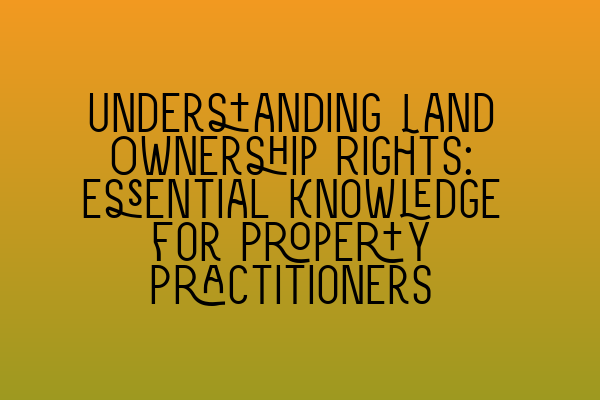Understanding Land Ownership Rights: Essential Knowledge for Property Practitioners
As a property practitioner, it is crucial to have a deep understanding of land ownership rights. These rights form the foundation of property law and play a vital role in property transactions and disputes. Whether you are involved in conveyancing, tenancy agreements, or land development, knowing the intricacies of land ownership rights is essential for providing expert advice to your clients.
Types of Land Ownership
Land ownership can take various forms, each with its own legal implications. The most common types of land ownership that property practitioners come across include the following:
Freehold Ownership
Freehold ownership is the most complete form of land ownership. When someone owns land freehold, they possess absolute rights over the property, including both the land and any buildings on it. Freehold ownership grants the owner full control and the right to use, enjoy, and dispose of the land as they see fit.
For property practitioners, understanding the intricacies of freehold ownership is crucial when dealing with sales, leases, and mortgages, as it affects how the property can be transferred or encumbered.
Leasehold Ownership
Leasehold ownership grants the tenant the exclusive right to use and occupy the property for a defined period known as the lease term. The tenant holds an interest in the property, known as the leasehold interest, while the landlord retains the freehold interest.
Leasehold ownership is common in residential and commercial properties where the land is owned by a third party, such as a developer or an investment company. Property practitioners need to understand the complexities of leasehold ownership to advise clients on lease agreements, renewals, and potential disputes.
Commonhold Ownership
Commonhold ownership is a relatively new concept introduced in the Commonhold and Leasehold Reform Act 2002. It allows for the collective ownership of a building or development, where each unit-holder has a freehold interest in their individual unit and shares the ownership of common areas with other unit-holders.
Commonhold ownership provides an alternative to leasehold ownership, especially for residential developments. Property practitioners should familiarize themselves with the intricacies of commonhold ownership, as it presents a unique set of legal considerations compared to freehold and leasehold ownership.
Legal Considerations for Property Transactions
When dealing with property transactions, property practitioners must consider various legal aspects related to land ownership rights. These legal considerations include the following:
Title Verification
Before proceeding with any property transaction, it is crucial to verify the title of the property. This involves conducting searches and reviewing title deeds to ensure that the seller has a valid and marketable title.
Property practitioners should have a thorough understanding of the different types of searches that need to be carried out, such as local authority searches, environmental searches, and land registry searches. This knowledge allows them to identify any potential issues or restrictions that may affect the property’s ownership.
Land Registration
Since 1925, land registration has been compulsory for almost all property in England and Wales. Property practitioners need to understand the land registration process and be able to navigate the land registry system to register, transfer, or remove an interest in land.
Having a comprehensive understanding of land registration ensures that property practitioners can effectively deal with the legal formalities involved in property transactions and safeguard their clients’ ownership rights.
Resolving Land Ownership Disputes
Land ownership disputes can arise for various reasons, such as boundary disputes, adverse possession claims, or breach of restrictive covenants. When faced with a land ownership dispute, property practitioners must be well-versed in both substantive land law and the dispute resolution process.
Property practitioners should advise their clients on the available remedies, such as negotiation, alternative dispute resolution methods like mediation, or resorting to the courts if necessary. By having a solid understanding of land ownership rights, property practitioners can provide their clients with accurate advice and representation throughout the dispute resolution process.
Conclusion
Understanding land ownership rights is paramount for property practitioners. Whether you are involved in property transactions, lease agreements, or resolving disputes, a strong grasp of land ownership concepts empowers you to provide expert advice and representation to your clients.
At SQE Property Law & Land Law, we offer comprehensive SQE 1 and SQE 2 preparation courses to equip aspiring solicitors with the necessary knowledge and skills in property law. To enhance your understanding of land ownership rights, check out our related articles:
- SQE 1 Practice Exam Questions
- SQE 1 Practice Mocks FLK1 FLK2
- SQE 2 Preparation Courses
- SQE 1 Preparation Courses
- SRA SQE Exam Dates
By continually enhancing your knowledge and staying up to date with legal developments, you can confidently navigate the complexities of land ownership rights and provide exceptional legal services to your clients.
